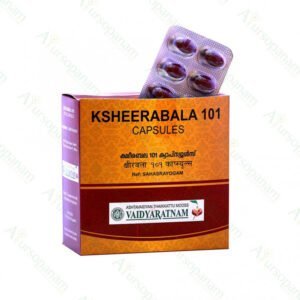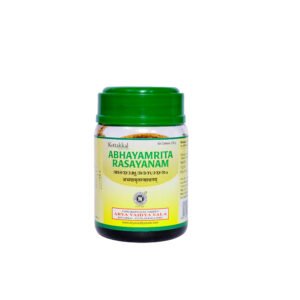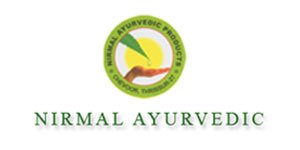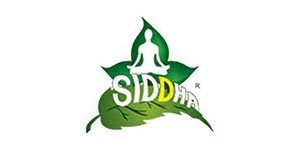‘Nimba’ or Neem bark known for its ‘Tikta’ rasa or bitter taste represents this formula that efficiently improves blood and liver function. Drugs dominant in ‘Tikta rasa ‘ or bitter taste act upon deranged pitta and ‘digest’ it. This maybe understood as the resolution of inflammatory changes in the gut as well as skin, bones, joints and supporting tissue. Nimbadi kashaya is a balancing combination of ‘pitta-samana’ drugs in an aqueous base.
Features & Benefits
- Balancing blend of Tikta rasa (bitter taste) and Seeta veerya (cooling nature) drugs that pacify deranged ‘pitta dosha’ in the system.
- Deranged pitta dosha vitiates ‘rakta’ (blood), heats up the body, interrupts metabolic pathways and causes up the build-up of endotoxins (ama), which manifests as chronic skin diseases and inflammatory changes in the gut.
- The Nimbadi kashaya combination pacifies the excess heat and acidity caused by this deranged pitta in the gut and bowel. Relieves sour belching, acid eructation, and indigestion.
- Improves skin health and immunity. Heal’s chronic lesions, with or without discharge, rashes and urticaria.
- Lifestyle diseases are invariably rooted in inflammation throughout the system. Nimbadi kashaya breaks down inflammatory pathways and restores metabolism.
Dosage and Instructions
Adult: 2-3 Tablets twice daily on empty stomach. Consume dissolved in half a glass of lukewarm water for best results.
Child: 1-2 Tablets twice daily on empty stomach. Consume dissolved in half a glass of lukewarm water for best results.
Key Ingredients
Neem (Azadirachta Indica)
It is a member of the Meliaceae family and its role as a health-promoting effect is attributed because it is a rich source of antioxidants. It has been widely used in Chinese, Ayurvedic, and Unani medicines worldwide especially in the Indian Subcontinent in the treatment and prevention of various diseases. Neem is considered a boon for mankind by nature. The use of Neem has been recommended by Ayurveda for a wide range of diseases. Such usage is attributed to its purification effect on the blood. Scientific research on Neem demonstrates it to be a Panacea. It is suggested to be an antibacterial, anthelmintic, antiviral, anticancer and more importantly Immunomodulatory agent.
Guluchi (Tinospora cordifolia)
It is a well-recognized and widely distributed traditional plant that is used successfully in Indian Ayurveda medicine. Guduchi helps increase the effectiveness of protective white blood cells which fight infection.The herb also augments immune responses to infections by influencing various immune effector cells and ensures early recovery. It’s effective in Infections in the respiratory system, skin, and soft tissues, Infected wounds, especially in diabetic conditions and immune-compromised conditions.
Shunti(Zingiber officinale)
Due to its strong flavor, Ginger is an essential ingredient in many Asian cuisines. Its therapeutic benefits have been recorded in Ayurvedic and Traditional Chinese Medicine. Ginger is a potent anti-nauseatic and is beneficial in treating upset stomach. Gingerol and shogaol, active components of Ginger, suppress gastric contractions. Both the fresh and dried rhizomes of Ginger suppress gastric secretion and reduce vomiting. The compounds 6-gingerol and 6-shogaol have a number of pharmacological properties, including antipyretic, analgesic, antitussive and hypotensive properties.
Haridra(Curcuma Longa)
The anti-inflammatory and antioxidant properties of Haridra assist in preventing the progression of diabetes-related changes in organs like the kidneys, retina, nerve cells and minute blood vessels in the body. Turmeric is a vital herb in Ayurvedic medicine, whose spice form can be recognized by its dazzling, yellow color. The root of the herb, used either fresh or dried, has a host of medicinal benefits. It acts as a carminative and also enhances the complexion and skin tone. in addition, Turmeric can be used to combat liver damage, respiratory disorders and ulcers.
Hareethaki(Terminalia Chebula)
Popularly known as Indian walnut for its innumerable benefits or Indian hog plum in English, it is extremely valuable for its role in improving hair health. It is useful for treating scalp infections like dandruff, itching, and hair fall. It also strengthens them from the roots, prevents breakage and loss of hair and bestows silky soft smooth hair. Chebulic Myrobalan is one of the three key ingredients in Triphala, a natural compound that provides overall support for digestive function and helps ensure that the digestive tract works at optimal levels. The Ayurvedic Pharmacopoeia of India has documented the use of the powdered herb in intermittent fevers and chronic fevers, anemia and polyuria. Chebulic Myrobalan can also be used to treat gastrointestinal and respiratory disorders
Amalaki (Emblica officinalis)
It is commonly known as the Indian gooseberry is high in vitamin C and natural antioxidants known as flavonoids and polyphenols. When used for hair treatments, it is found to strengthen and condition follicles down to the roots. Amla oil can promote hair growth, reduce dandruff, and prevent the graying of hair.
Vibhithaki (Terminalia Bellerica )
Known as beach almonds or Bedda nut tree It is rich in Vitamin C, and other antioxidants that nourish the hair roots. Bibhitaki helps in making the roots of the hair stronger, minimizing hair fall, and preventing premature graying of hair strands.
Patola(Trichosanthus Dioica)
Patola has anti-allergic and anti-inflammatory actions. The various chemical constituents present in the plant show anti-inflammatory activity. Patola is very useful in skin diseases by its anti-inflammatory and anti-histamine activity.
















































Ratings & Customer Reviews
Reviews
There are no reviews yet.